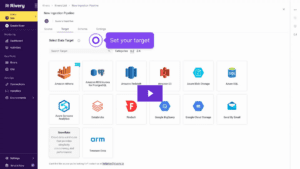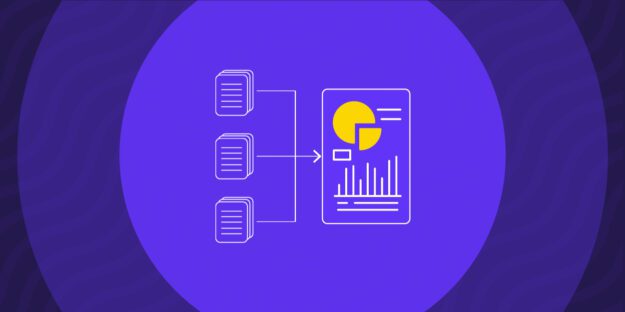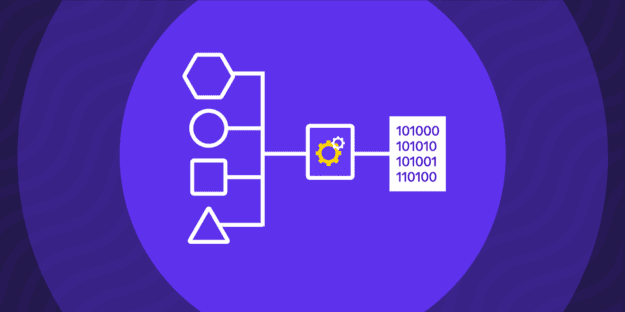Drowning in data spread across multiple sources is not a fun thing. Thanks to data connectors, you can now combine data into a single, unified system, but with so many data connectors available, how do you choose the right one?
That’s where Rivery comes in. Rivery offers a comprehensive integrations page, making it easier for you to connect with more than 200 data sources and transform your data into actionable insight.
But what are data connectors exactly, and how can they help your business maximize the full potential of your data? Let’s dive in and find out!
What are Data Connectors?
A data connector is a software component that reads data from different sources and delivers it to a predetermined destination. They’re in fact intermediaries between different software applications, platforms, or databases, allowing you to correctly interpret and transmit data.
In today’s vast digital world, businesses can store and manage their data in various applications and systems. The thing is, one system might use a RESTful API while the other SOAP, for example. This is when data connectors come into the picture, building a bridge between both systems, thus making communication possible and overcoming any differences and incompatibilities.
There are various data connector types, including API, database, pre-built, social media, cloud, and custom connectors. They’re most common in analytics, data science applications, and business intelligence.
Unlike manual data input, a data connector eliminates the need to transfer and store data between multiple systems, storages, and services. Not only that, but it can also help you save time and minimize errors by automating the data transfer and synchronization process.
Data connectors are an essential tool for businesses, especially for marketing and advertising agencies, healthcare organizations, e-commerce businesses, and financial institutions, as they all rely on integrating data from multiple sources into one unified source.
Business Benefits of Data Connectors
Data connectors can help your business in many different ways, as they themselves have various use cases. That said, let’s take a look at some of the key benefits data connectors have for your business.
Data Connectors Aid Data-Driven Decision Making
Data connectors are forever changing the way businesses make decisions. While some still rely on gut feeling, others are already using data connectors to their advantage – integrating data from various sources and providing access to real-time data.
Relying on intuition can result in biased decisions that aren’t based on accurate information, while focusing on accurate data will lead to more informed decisions, which can result in better outcomes in terms of business success.
By making the most out of data-backed predictions, you can gain insights into customer behavior, customers’ needs and preferences, and market trends and give your business a competitive edge.
That’s why collecting, analyzing, and putting data into action in this competitive digital market is crucial for making informed business decisions.
Increased Efficiency
Besides improving the decision-making process, a data connector helps increase efficiency in many ways. First and foremost, it can automate the data transfer between two systems, and therefore help you save tons of time and effort.
Additionally, data connectors minimize the need for manual data input and complex coding. By doing so, you can improve the business’s workflow and boost productivity, as it can reduce the amount of time employees spend manually transferring data between systems.
Improved Accuracy
Even though manual data entry is still used in many businesses and industries, it is a time-consuming and prone to error process. Data connectors, on the other hand, accurately transfer data without the need for human intervention.
Besides that, data connectors can perform data validation checks to ensure the transferred data meets requirements. This means that any error and inconsistency in the yet-to-transfer data will be timely tracked.
Data Connectors Can Assist With Competitive Intelligence
Data connectors are also valuable when it comes to analyzing your competitors and gaining competitive intelligence. By doing so, you can gain insight into your competitor’s online presence, including their product offerings, marketing strategies, customer sentiment, and market position.
Not only that, but they can help you recognize trends in your market and industry, which can result in improved decision-making and a stronger competitive edge for your business.
Improved Collaboration
Good teammate work is important, and data connectors can help you achieve it. They allow your teams to work with the same data source, improving collaboration and significantly reducing miscommunication and errors.
Additionally, your employees will work with the most up-to-date information, as data connectors enable real-time data sharing. This is especially beneficial for teams working on time-sensitive projects.
Most importantly, data connectors help your employees see the bigger picture and make informed decisions, which can result in more effective teamwork and aligning their work around a common set of data and goals.
When Should You Build Data Connectors?
As you can see, there are various data connector uses, so you might wonder when you would need it in practice. All businesses can benefit from data connectors, but it mostly depends on your business’s unique needs and the amount of data you need to process.
For example, if you’re dealing with a large amount of data from multiple sources, data connectors can help you integrate and manage this data effectively. Using different data connector types, such as ETL or API, allows you a holistic view of your overall business’s performance, including customers and operations.
Taking this into account, data connectors have many potential uses and benefits for your businesses, especially in terms of data-driven decision-making in real time. By implementing them in your business, you’ll surely get a better understanding of your customer’s needs and preferences, which can help you improve your performance and stand out against competitors.
When Should You Use Pre-built Data Connectors?
While every data connector type has its own unique set of features, pre-built connectors with their pre-configured use are definitely at an advantage. They’re your best option, especially in cases when you don’t have the resources to build custom connectors from scratch.
That said, let’s take a look at some of the situations when you need to consider pre-built data connectors:
- When you want to reduce costs. Creating custom data connectors from scratch can be expensive, especially if you don’t have experience and need to hire specialists. Pre-built data connectors eliminate the need for expensive development, as they’re pre-configured to use with different systems and platforms.
- When you want to save time. Secondly, pre-built data connectors greatly save time, as they were originally designed to simplify the integration process. They enable a quick setup, so you won’t need to invest your time in developing, considering they’re already developed and tested.
- When you want to enhance security. Not only are pre-built connectors pre-configured but are also far more secure. They’re carefully developed and tested by specialists, ensuring the data integration process is reliable and secure.
- To stay up-to-date. What’s very important to note is that pre-built connectors are regularly updated, so you’ll keep a constant pace with any changes in the systems they’re integrated with.
All in all, pre-built data connectors can benefit any type of business with their wide range of uses, but at the end of the day, it depends mostly on your business’s needs and goals.
Practical Example of a Data Connector
Practical data connector examples are the best way to understand how they work and how they can benefit your business. From marketing agencies to manufacturing companies, data connectors can be a key tool for many different types of businesses.
We’ll take an API data connector as an example. Let’s say you’re in the e-commerce business, and your platform sells products on popular platforms such as Amazon and Shopify. In order to make informed business decisions and improve your business performance, you must keep track of sales and customer data across all these platforms.
To do this successfully, you can use the API data connector to connect your online store with the platforms you’re selling on. For example, you can gain insight into data such as sales and customer reviews from Amazon. You can later analyze this data to drive sales, improve customer experience, and increase operational efficiency.
How Can Rivery Help?
Rivery is a data integration platform that can help you integrate data from various sources. You’ll never again have to update an API data connector or engage in complex coding. Instead, you’ll have access to an easy-to-use interface and the ability to create pipelines in just a few minutes.
Rivery offers you more than 200 pre-built data connectors to popular data sources such as Microsoft Azure, Salesforce, Facebook, and Magento. However, the list keeps growing and we are continuously adding new connectors to it.
This wide range of pre-built connectors eliminates the need for manual data input, which can help you save time and effort, improve workflow, and reduce costs. Thanks to Rivery, the process of collecting, transforming, and loading data has never been easier!
Minimize the firefighting. Maximize ROI on pipelines.





